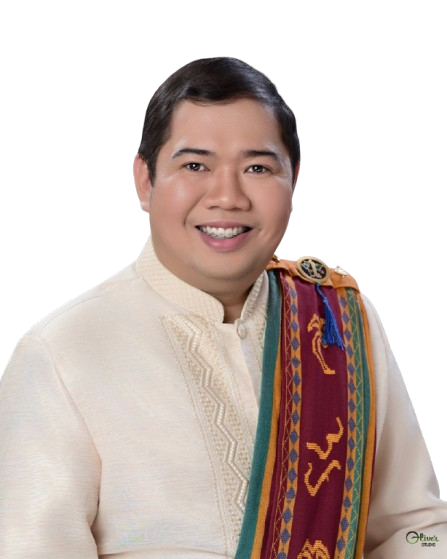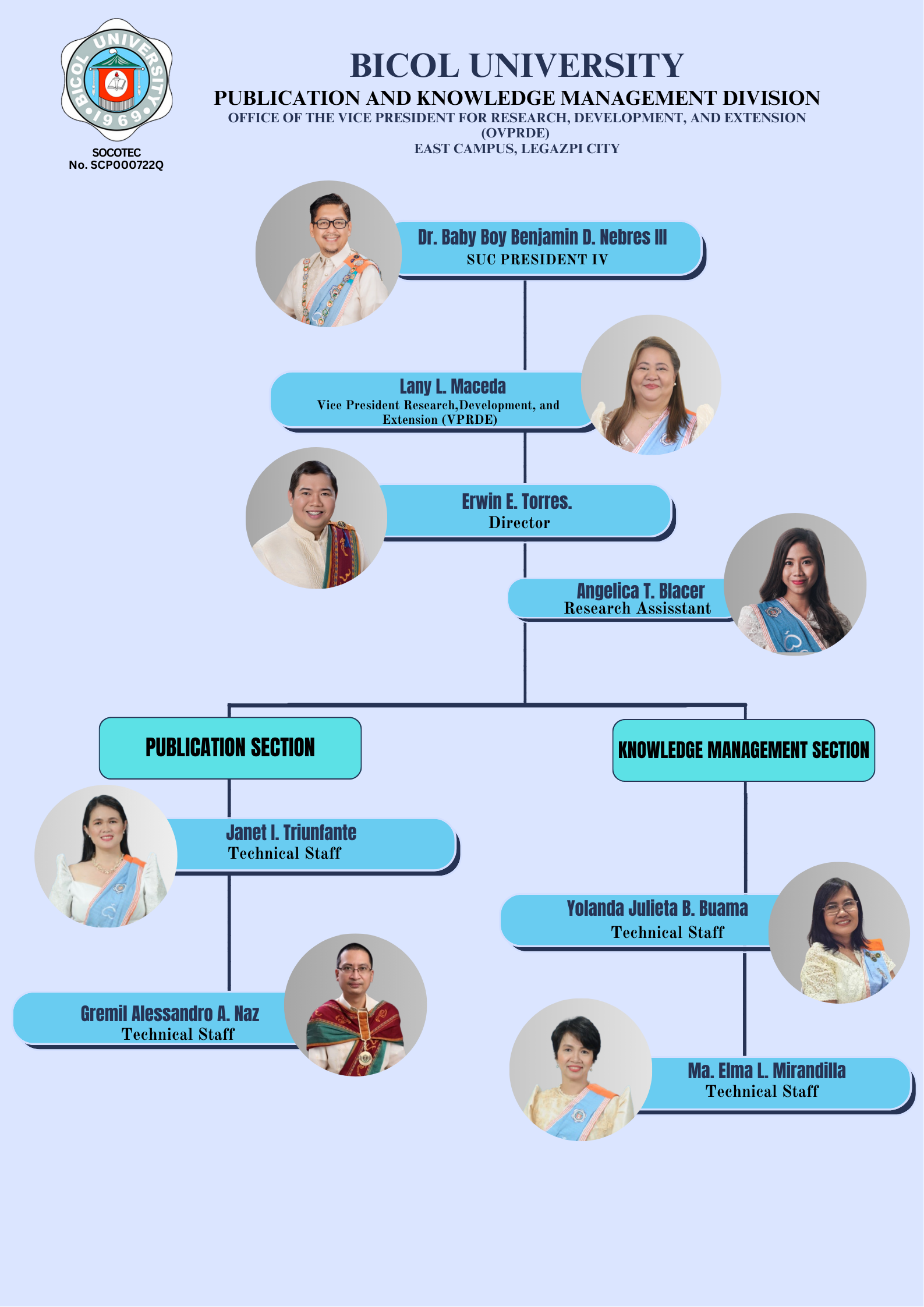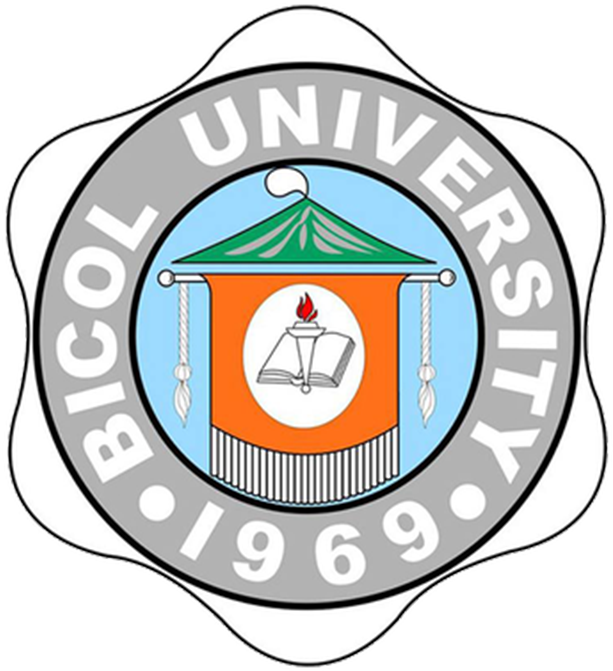
Publication and Knowledge Management Division
ERWIN E. TORRES, PhD
PKMD Director
ANNOUNCEMENTS
The RDESys Integrated Databank System is now live! Experience the future of data management. The Call for BU-Funded Research and Development Proposals is now open until May 15, 2025 . Submit through the RDESys-ProMIS: Proposal Management Information System. Click Submit Now!
About Us
The Publication and Knowledge Management Division (PKMD) shall oversee all publication-related activities and serve as custodian of all records pertaining to RDE. The Division shall have two (2) sections/offices, namely:
Functions
The Publication and Knowledge Management Division (PKMD) shall oversee all publication-related activities and serve as custodian of all records pertaining to RDE. The Division shall have two (2) sections/offices, namely:
(a) Publication Section and
(b) Knowledge Management Section.
Publication Section shall perform the following functions:
Publish recent trends and developments in research, development, and extension in the University through newsletters and other popular media;
Supervise the Editorial Committee in the selection and review of technical and scientific papers and the selection of referees from various disciplines based on the given editorial policies;
Conduct various capability-building initiatives and other support mechanisms aimed at strengthening the publication in the University and;
Ensure wide and timely dissemination of various publications to concerned stakeholders.
Knowledge Management Section shall perform the following functions:
Maintain a system for the collection, storage, and retrieval of research, extension, and creative work information of faculty, staff, and students;
Oversee the monitoring of RDE output utilization from programs, projects, or activities;
Prepare reports for submission to other offices or agencies; and
Provide relevant RDE information to other offices for decision-making or policy-making purposes, dissemination and publication, and other organizational development purposes.
Revised RDEM (2025)
Sections
Publication Section
The Publication Section is responsible for publishing recent research trends, supervising the Editorial Committee in reviewing technical papers, conducting capability-building initiatives to strengthen university publications, and ensuring timely dissemination of publications to stakeholders.
Knowledge Management Section
The Knowledge Management Section manages the collection, storage, and retrieval of research and creative work information, monitors the utilization of RDE outputs, prepares reports for various agencies, and provides relevant information to support decision-making, policy development, and organizational growth.
Training and Technical Support Services Section
The Training and Technical Support Services Section (TTSSS) is responsible for organizing training programs, workshops, and seminars to enhance stakeholder capabilities in RDE activities. It provides essential technical support, ensuring researchers and extension workers have the guidance and resources needed to implement projects effectively and align with institutional goals.
Organizational Chart

Programs and Projects
STUDENT R&D FORUM
Background
Recognizing the value of student research and their potential as professional researchers in the future, Bicol University has been continually implementing the Annual BU Student Research Forum. The activity serves as an academic catalyst, bringing awareness and appreciation among students about the challenging and fertile field of research. Students at the collegiate level constitute a vast manpower potential for research. Student research in the form of theses, dissertations, field immersion studies, and the like could complement the research and development activities of faculty members on a wide array of topics. These research activities of the students, when properly guided, could enhance their research potential and widen the breadth of R&D activities of the university.
This year’s university research forum will again showcase the best student research for the school year 2024-2025. In recent times, achieving a sustainable future is being emphasized. The National Research Council of the Philippines (2025) specifically identified four categories which research works may tackle – human sciences, natural sciences, chemistry and health science, and agricultural sciences. The RDE Agenda is consistent with these categories.
In upholding quality research outputs, the student entries shall be reviewed and critiqued by a panel of evaluators across the different aspects of research, i.e. from the significance of the topic/subject, the methodology adopted, analysis and interpretation of results, and the utility of research results. The best student thesis in the research or development category in every RDE Agenda shall be awarded at the end of the program.
Objectives
The activity generally aims to provide a venue to stimulate interest and appreciation for research among students and faculty members. Specifically, it seeks to:
a. showcase student research according to the different research agenda and categories;
b. review, evaluate, and identify outstanding R&D outputs of students per RDE Agenda; and
c. identify student research for further research, promotion, dissemination, or commercialization.
Expected Outputs
The following are the expected outputs of the activity:
a. Outstanding student research per research agenda and categories
b. Technologies for further research, promotion/dissemination, or commercialization
c. Database generation for research
Methodology
The 20th Bicol University Student R&D Forum will be catering for the presentation of completed research as of the school year 2024-2025. Each entry submission shall be categorized according to agenda and category (either research or development) as per endorsement from the colleges/ units. However, the organizers may re-assign them as necessary. In case of a few entries, some RDE agenda and/ or categories may be merged accordingly. The categories shall adhere to the five RDE Agenda as follows:
- Agriculture Aquatic and Natural Resources (AANR)
- Industry, Energy, and Emerging Technology (IEET)
- Health and Health Systems Management (HHSM)
- Climate Change Adaptation and Disaster Risk Reduction and Management (CCA-DRRM)
- Inclusive Education and Lifelong Learning (IELL)
To systematize the competition, proponents shall follow the guidelines for submission of entries as found in Appendix A. The format of the paper is described in detail in Appendix B.
The mechanics for evaluation is reflected in Appendix A. Winning entries for Best Paper, 2nd Place, and 3rd Place will be selected per agenda and category.
RDE AWARDS
II. Rationale
Bicol University has been in the forefront of knowledge generation and innovation that contribute to regional development. This is embedded in the university’s research and extension functions. In response to the dynamic needs of the Bicol Region and the evolving global landscape, Bicol University has revised the Research, Development, and Extension (RDE) Agenda, also known as BU KUGOS for 2024-2028. This comprehensive roadmap aligns with various legal mandates and compelling rationales to pave the way for impactful and elegant research and extension undertakings in the next five years.
The university, through the Program on Awards and Incentives for Service Excellence (PRAISE) recognizes and rewards employees for their innovations, inventions, superior accomplishments, and dedicated service that contribute significantly to the effectiveness, efficiency and economy of the BU operations and to exemplary acts or quality service for public interest. These accomplishments contribute to PREXC, SUC levelling, and other performance metrics. Over the years, BU provides awards to personnel who excel in RD&E is in accordance and in compliance with BOR Res. No. 006 s. 2009 – Manual of Operations for Research and Development (MORD). Thus, this proposal on the conduct of “Bicol University Research Development & Extension Awards Night 2024”.
This award – giving ceremony celebrates the achievements of those who have participated substantially to Bicol University’s feat in contributing to RD&E outputs such as, but not limited to: (1) winning an award in RD&E presentations in international, national, or regional fora or conferences; (2) completing RD&E-based papers or articles that are published in CHED accredited journal; or international refereed publications such as Elsevier Scopus and Thomson Reuters Journal, (3) acquiring Certificates of Patents, Utility Model, Industrial Design, and Copyrights from their official RD&E undertakings, and (4) achieving Outstanding Performance in Extension undertakings. This affair will serve as an inspiration for all faculty members to continuously pursue productive scholarship and collaborative service for sustainable societies.
III. Objectives
This activity generally aims to give due recognition to faculty for their invaluable contribution to RD&E and serve as a venue for faculty, researchers/ extensionists, and deans/ directors to build collaborative engagements and promote camaraderie. Specifically, it aims to provide recognition to the following:
a. Faculty who won an award in RD&E presentations in international, national, or regional fora or conferences;
b. Faculty who have completed RD&E-based papers or articles that are published in CHED-accredited journals; or international refereed publications such as Elsevier Scopus, Thomson Reuters Journal and ASEAN Citation Index journals;
c. Faculty who acquired Certificates of Patents, Utility Model, Industrial Design, and Copyrights from their official RD&E undertakings, and
d. Individual Faculty, Specific Program/Project and College who achieved an Outstanding Performance in their Extension implementation.
Key Program Concerns
*insert text*
Resources
*Insert Text*
Reports
*Insert Text*
Contact Us




